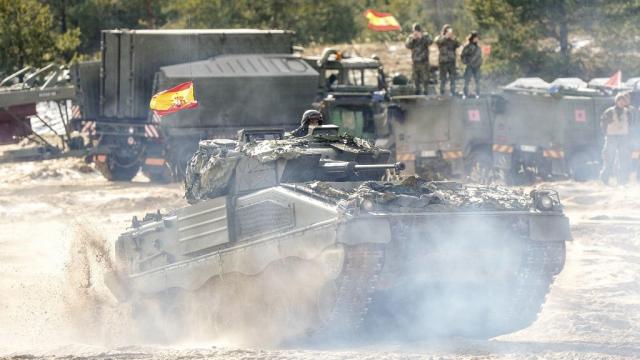
Some 2,800 troops are this week taking part in the first-ever live European Union military exercise in a bid to boost the bloc’s ability to respond faster to crises outside its borders.
“Today we are creating a new page in the EU defence,” Josep Borrell, the EU’s High representative, told reporters aboard the Juan Carlos I amphibious assault ship in Cadiz, Spain.
Recent events in the bloc’s direct neighbourhood, including Russia’s full-scale invasion of Ukraine and the deadly attack carried out by Hamas militants on Israel last week, “only show that as Europeans, we need to step up our security, and defence is part of our security”, he added.
Thirty-one units including maritime, air, land, space and cyber assets from Austria, France, Hungary, Ireland, Italy, Malta, Portugal, Romania and host country Spain are taking part in the week-long military exercise.
They will, for instance, simulate an amphibious assault to secure a harbour.
Planning is already underway for the next rounds of exercises, with Germany expected to lead the second edition, scheduled for the second half of 2024.
‘Part of our everyday reality’
The aim is to boost readiness and interoperability between EU countries’ armies as well as to advance towards the creation of a so-called Rapid Deployment Capacity with other scenarios for exercises including rescue and evacuation, support for humanitarian assistance and disaster relief, Borrell said.
“Unfortunately, these are the scenarios we have to deal with, and we have to be prepared for doing so. They will be part of our everyday reality as we see today, dramatically, in our most direct neighbourhood.
“As (the) EU, we need to be ready to act as required to protect our citizens and to contribute to global stability. And for that, we need to exercise together. This will help us to be better prepared to play a role as a defence actor and global security provider,” he said.
These new exercises, he went on, will “boost the EU’s ability to act faster, to respond to crises outside the EU, and it also helps to build a common strategic culture on defence.”
“I said many times, Europeans need to build a common strategic culture in order to face together the challenges of the world in which we live,” he also said.
Establishing a Rapid Deployment Capacity is one of the cornerstones of the Strategic Compass adopted by EU leaders last year to strengthen the bloc’s security and defence policy and make it a more capable security provider.
It is meant to be operational in 2025 with up to 5,000 troops and capabilities deployable quickly to respond to different types of crises, including the airlift of EU citizens from foreign countries as was the case recently in Niger, Sudan or Afghanistan.
‘Maybe we could have got it quicker’
Some EU states have been reticent about plans for a more coordinated defence policy at the EU level, an idea championed by France, over fears it would lead to a weakening of NATO’s role in the region.
But the Taliban takeover of Afghanistan in the summer of 2021, which left Western countries scrambling to evacuate their nationals, injected new impetus into negotiations. Russia’s buildup of troops along its border with Ukraine and subsequent full-scale invasion led to an agreement.
Asked whether the Rapid Deployment Capacity would have been of any use over the events unfolding in the Middle East if it had already been established, Borrell said the EU “should be able to do a lot.”
“At that moment the most important thing is to deploy humanitarian assistance to the people in need in Gaza. This will require a lot of logistic capability and it will require also military support and protection.
“Certainly, we should not intervene in such a fight, but if EU wants to protect civilians and we want to provide support to them, it will need a lot of logistic capacity, and this will be one of the missions of the deployment capacity,” he said.
But when questioned about whether the creation of the Rapid Deployment Capacity is too little too late, he conceded that “yes, maybe, maybe we could have got it quicker.”

